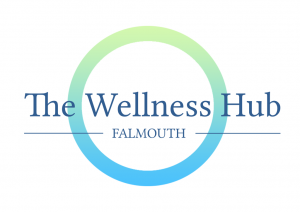
Supporting ourselves – How Essential Oils Can Help
Life is complex with so many challenges – both expected and unexpected. In recent years we have all been faced with situations beyond our control and had to manage and navigate through them financially, emotionally and physically. Often when moving through life’s complexities, our emotional resources can become drained and we find our resilience eroded by continually having to ‘show up’ daily for whatever life is presenting us with and keep going to maintain financial stability or our presence within the family home. And it is this relentless struggle against overwhelming workloads or seemingly unsolvable issues that begins to affect our mood which can result in symptoms of anxiety.
Experiencing symptoms of anxiety or developing Generalised Anxiety Disorder ‘GAD’ is unsettling and complicated. Symptoms can range from ‘overthinking’ and repetitive worries that just won’t stop. Digestive disturbances such as stomach churning, nausea or diarrhoea, a loss of appetite or over-eating or the dreadful effects of insomnia. At its worst anxiety can present in panic attacks which can happen at any moment and are profoundly debilitating. All of this can result in a loss of confidence and ability to manage daily tasks, to socialise and can cause low-mood.
Statistics show that more people than ever before have been in contact with NHS services, with regard to their mental health and well-being, seeking support to enable normal life to continue. Time lost or reduced performance at work and a compromised ability to function with every-day tasks simply adds to the psychological burden and when there isn’t enough immediate, effective support available or limited external support options, we are left holding the issue ourselves. It is at this point we have an opportunity to connect to our personal needs and create our own self-support strategy.
Fortunately nowadays, taking our well-being into our own hands is easier than ever before with countless apps, books, online resources, classes and therapeutic treatments available everywhere. From meditation rituals through to supported outdoor nature activity sessions like wild swimming, cooking on fires and woodland exploration walks, there really is an abundance of options at our fingertips. To enhance activities, bodywork treatments such as massage, Reiki and acupuncture, as well as other therapies like counselling, life coaching and hypnotherapy can significantly change or even completely stop anxiety symptoms. In my own practice, it is working with essential oils that fundamentally provides enhanced, treatment effects.
Essential Oils are both my therapeutic tools and ‘team’ and there are many that can be used to reduce symptoms of anxiety – offering immediate relief when an attack occurs. As explained in the previous newsletter, the various natural compounds in essential oils are absorbed through the body’s nasal, skin and breathing mechanisms and work on the brain’s neurological messaging pathways to restore and regulate the body’s systems. Some of the most gentle, yet effective oils for addressing symptoms of anxiety are:

Lavender, (Lavandula angustifolia)
Known as the ‘nursemaid’ of the oils, essential oil derived from the flowers of the lavender plant can soothe and calm a restless mind and aid sleep. It’s crisp dry clean scent is comforting yet restorative and it only takes a drop or two to bring an instant sense of relief.
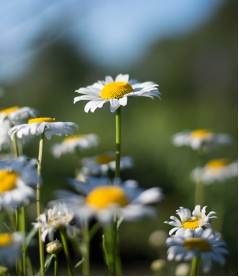
Roman Chamomile, (Chamaemelum nobile)
Extracted from the aerial parts of this European native, this gentle, sweet-smelling yet powerful oil can offer comfort to the most upset and disturbed conditions. One of the few oils recommended for use with young children and newborns, its delicate yet distinctive apple-like aroma can quickly pacify a fractious, anxious state and also enhance sleep.

Geranium, (Pelargonium graveolens)
Extracted from the plant leaves, geranium is a great mood balancer, bringing harmony to the mind. It’s round, soft floral scent is indicated as being especially effective for hormonal ups and downs. Please note that the use of geranium oil is contraindicated for people using diabetes medication. If you suffer with diabetes, check with your GP before using.
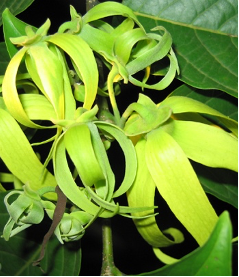
Ylang-ylang, (Cananga odorata)
Steam distilled from the flowers of this stunning tropical tree, this ubiquitous heady, floral oil is powerful and effective when it comes to offering a shift in mood. Deeply relaxing and regulating, ylang-ylang brings an enchanting, floral blast in an instant to calm, ground and lift the mood.

Bergamot, (Citrus bergamia)
Fresh and uplifting yet gentle, the aroma of bergamot is a sparkling citrus boost that can cut through grey feelings. Providing a background of clean, refreshing notes bergamot can revive and restore blue skies in the mind. Please note, bergamot is a photo-sensitising oil and should not be used on the skin before sunbathing. (The good news is that there is a non- photosensitising version of bergamot oil known as ‘bergamot FCF free’. Look out for this one when purchasing if you are going to use it on the skin and sunbathe.)

Vetiver, (Chrysopogon zizanioides)
Derived from a perennial plant grass, vetiver provides a deep, earthy aroma that grounds and calms an anxious mind. Again, another oil that can enhance and facilitate sleep, it is a hugely relaxing aromatherapeutic note that can counter nervousness, shock and trauma. It blends well with floral oils such as geranium and ylang-ylang as well as citrus oils.
There are many ways to use essential oils, from putting a drop on the tissue and inhaling directly or at home in a diffuser or in the bath. Or you can make up your own hand or body massage oil by adding to a few drops to a base oil such as sunflower seed or sweet almond. Used alongside other relaxation techniques such as breathing exercises, meditation, walking listening to relaxing music, swimming and yoga, essential oils can help to manage and bring relief from anxiety symptoms. There are a huge range of books publications and online blogs available to follow and learn more about the wide range of benefits offered by these beautiful plant oils making it is possible to engage with them at many levels and introduce an effective fragrant means of well-being support.
One simple and easy to apply method is provided by pulse point roller for applications. These ready-made essential oil blends come in small glass bottles with either a metal or plastic roller ball under a cap which can be applied to the wrists and pulse points on the wrists behind the ears knees and creases of the elbows. Understanding how many benefits are gained through the therapeutic use of essential oils within my practice, I have developed ‘O L C H E M É’, a range of pulse-point rollerball blends using certified organic essential oils and specialist absolutes. These blends are carefully created from the highest quality ingredients and can be worn as a therapeutic fragrance to offer relief from anxiety, low mood and tension that can trigger symptoms of migraine. Launching at the end of March, these will be available at my clinic in the Wellness Hub or via the website, www.olcheme.com
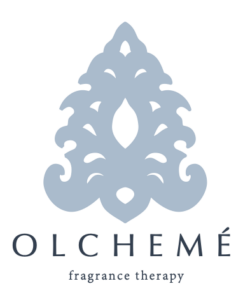
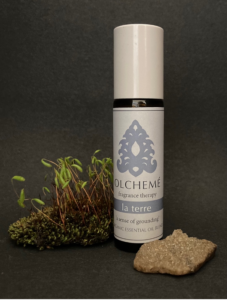
*It’s important to note that essential oils what’s never be used neat on the skin and should always be diluted with a base carrier oil before application. They are widely available in a range of sizes but it is important to buy from a reputable supplier, avoiding very cheaply priced oils.
Contact Irene and book in via our website
